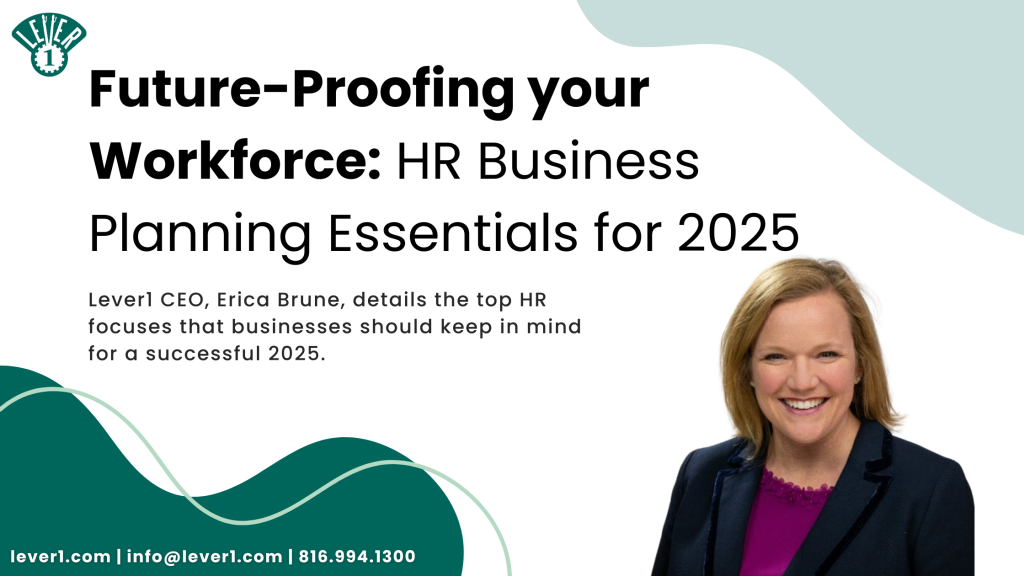
As the year begins to wind down, it is time to look ahead and plan for 2025. Whether you are aiming to grow your business, optimize operations, or expand into new territories, it is essential to create a plan to aid in reaching your goals. Our HR and compliance experts have compiled the top HR focuses that business owners should keep in mind for their 2025 planning.
Artificial Intelligence
The use of Artificial Intelligence (AI) will continue to expand in 2025. Regardless of your company size or if your business has already adopted the technology, likely your employees are already using it on their own. With many free trials online, employees have been found to unknowingly share proprietary company information or even confidential client data in effort to rewrite emails, proposals or sort data. While the intent by employees is encouraging, exposure now exists for employers regardless of your stance on AI in the workplace. It is time to create an AI policy for your employees, detailing the proper uses and procedures regarding the technology. AI systems store large amounts of data, which could become a confidentiality concern. It is important to set clear guidelines for use, so employees do not input sensitive information including company and client proprietary data into public AI systems.
Handbooks
While remote work became common practice in many companies due to the pandemic, an increasing number of employers are requiring employees to return to the office. Whether you are moving operations fully in person or creating a hybrid schedule, there is room for all employers to revise policies to create clear expectations for employees. Consider where reasonable accommodation can be made for remote work while also understanding what duties need to be handled in the office.
Apart from remote work, other details of employee handbooks likely need yearly refreshing. Over half of the states are implementing new laws in 2025 that could impact your workplace, from minimum wage increases to paid sick leave. It is necessary that your handbook is up to date to remain compliant with the new laws. When incremental culture shifts occur throughout the year, it is important to reevaluate dress code, code of conduct, inclement weather, and other subjective policies.
Cost-of-Living Adjustment
The Social Security Administration recently announced that the COLA or cost-of-living adjustment for 2025 is 2.5%, which is the lowest increase since 2020. This is crucial information for business owners as some employers award employee raises based on the cost-of-living adjustment for that year, rather than merit-based increases. With the inflation rate increasing again, COLA-based raises may not be enough to retain valuable employees. Utilizing compensation analysis tools may be helpful to evaluate the balance between COLA and merit raises. Conducting this analysis helps maintain competitiveness in recruitment and retention by ensuring individuals are fairly rewarded for their performance and helps to have productive conversations with employees based on third party market data.
Financial Wellness for Everyone
Small businesses often face hurdles when it comes to offering retirement plans for their employees. However, recent changes in tax laws have introduced new incentives aimed at encouraging businesses to initiate and maintain retirement plans, including tax credits. It is now more cost effective than ever to offer a start up 401(k) plan for small businesses. There are now three distinct tax credits available for small businesses related to plan fees or contributions. These tax credits can significantly benefit businesses, potentially reducing financial burdens and promoting employee financial wellness.
Training
Training establishes transparent communication within your organization to ensure your employees feel comfortable, safe, and aware of the appropriate channels of communication if issues arise. By conducting annual training on topics such as anti-harassment or diversity, equity, and inclusion, you can create a positive and respectful work environment, while also protecting your organization.
Outside of required training, consider investing in your team by offering opportunities for upskilling and reskilling. Start by identifying where skill gaps lie and implement training programs to fill those gaps. Creating mentorship opportunities, conducting leadership training, and offering continued education are also methods of upskilling. By providing such resources, you can empower your employees’ professional development and further strengthen your workforce.
Job Descriptions
The duties associated with a role may evolve throughout the year, and it is important that the job description for that role changes with it. Like handbooks, job descriptions should be reviewed each year to ensure that they are complete and accurate to the responsibilities of the actual role. It may also serve as a reminder to employees of any tasks or duties that may have been missed.
Another cause for reviewing job descriptions is the recent reversal of the U.S. Department of Labor’s Overtime Rule. The rule would have changed the salary threshold for exempt status but is now reverted to the 2019 level of approximately $35,568 annually ($684/week). Employers who have already made changes to their employees’ exemption status may consider reclassification; however, reversing these changes can be challenging, so this decision must be made carefully.
The end of the year is the perfect time to reflect on your organization’s strengths and areas of improvement, so that you can further develop your success in 2025. Creating a well-rounded HR program can set the tone for the entire year, boosting employee retention, morale, and decreasing your risk as a business owner. Start your 2025 HR planning right by consulting our experts here at Lever1.
Erica Brune | CEO
As Owner and CEO of Lever1, Erica is responsible for strategic planning, management and business oversight. With Erica’s guidance, Lever1, a fully accredited professional employer organization, has secured an industry-wide reputation of excellence, operational reliability and thought leadership.

